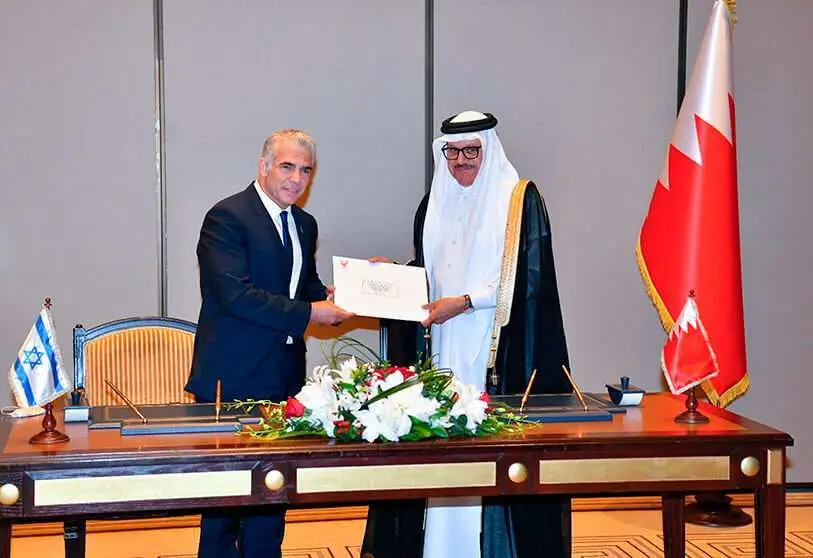Israel opens embassy in Bahrain one year after beginning diplomatic relations

A year ago, Morocco, the United Arab Emirates, Israel and Bahrain signed the Abraham Accords. It marked the beginning of diplomatic relations between Israelis and Bahrainis, which now confirm their close ties with the opening of the Israeli embassy in Bahrain. In addition to the inauguration, the launch of an air bridge between the two countries was announced with the first regular flight between them. The flight was made by a Guf Air plane from Manama to Tel Aviv, where it was welcomed with a ceremony.
This is the first official trip by any Israeli official, in this case Yair Lapid - the foreign minister - to the small Arab country. Lapid met with King Hamad bin Isa Al Khalifa in an event that marked the ratification of what are expected to be strong diplomatic ties. Bahrain's Undersecretary for Civil Aviation Affairs, Mohammed Thamir Al Kaabi believes that "the launch of the first flight brings exciting new opportunities between our countries and allows our peoples to finally come together and establish connections that will create a brighter future".

Israel's foreign minister had already visited the other signatory states of the Abraham Accords, Morocco and the UAE. In what they described as a "historic agreement", Israel was recognised by these countries in exchange for a series of trade agreements and treaties. Both Lapid and Al Khalifa were keen to achieve the "long-awaited lasting peace in the Middle East" which, they say, has been greatly facilitated by the signing of the Abraham Accords. This treaty featured the important figure of the United States, which, during Donald Trump's presidency, managed to end decades of disputes and blockade.
Cooperation between Israel and Bahrain will not stop there, or at least that is the current intention on both sides. In addition to the opening of the new embassy, a raft of new agreements will be signed that will continue to bring the parties closer together and strengthen ties between the two. Health and economic issues are among those on the negotiating table, although a possible water transfer agreement is also on the table. Many of these moves are driven by fears of Iran's growing military might and influence in the region.

Ebrahim Raisi's country is a major concern, not only for its neighbours, but for the international community as a whole. Tehran continues to enrich uranium to a level of purity that is beginning to open the way for the production of nuclear weapons, something that the International Atomic Energy Agency (IAEA) has already warned about. In fact, the president, Rafael Grossi, said that "the Agency's confidence that it can maintain continued knowledge (of Iran's nuclear activities) is deteriorating over time and has now deteriorated even further".
What is clear to countries such as Israel and Bahrain is that, if they want to remain outside Iranian influence, they must join forces to form important alliances. And they must do so despite the reluctance of a large part of Bahraini society to recognise Israel due to the conflict with Palestine. Yair Lapid made reference to this during his visit to Bahrain: "I think it is the right solution (to create two states) for Israelis and Palestinians. Not everyone in the (Israeli) government thinks so, but right now it is unfortunately not feasible," he said at a table after the joint press conference.








